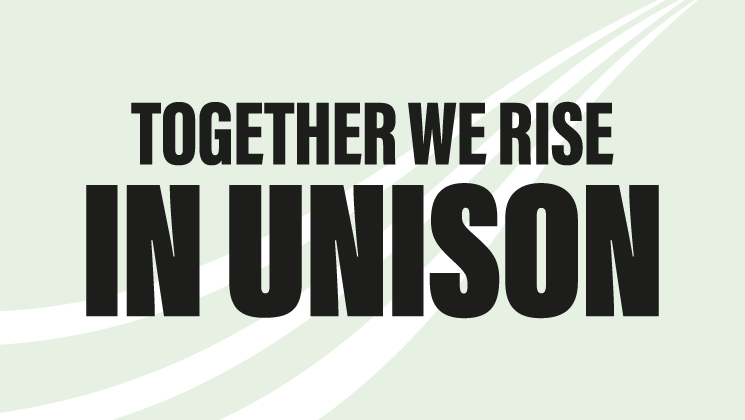“People are having to make real decisions every day based on what money is in their pocket,” says Lyn Marie O’Hara, a cleaning supervisor in Glasgow, who is currently seconded to UNISON’s national executive council.
The cost of living is currently the critical issue for most of UNISON’s members. Public sector pay – as well as the pay of privatised or outsourced counterparts –- has lagged behind inflation for almost a decade, shrinking pay packets in real terms.
As energy bills rocket and inflation spikes, applying enormous pressure on food, clothing and every day essential costs, the cost of living has come into sharp focus and the government’s response has been too little, too late.
On 18 June, trade unionists from across the country and across industries, will take to London’s streets as one to ‘Demand Better’ at the TUC’s march and rally.
Among the crowd, UNISON’s ‘sea of purple and green’ – no doubt in good numbers and voice, will be declaring that ‘Together We Rise’ – the latest step in the union’s campaigning in response to the cost of living crisis.
Together We Rise
Together We Rise will also be a theme of UNISON’s national delegate conference in Brighton the week prior to the march and, moving forward, the campaign will provide a cross service group underpinning to bargaining, negotiating and pay claims, involving the public and pressing the UK government for fair pay and better support.
Alongside the national campaign, regions and branches will be provided with toolkits to allow them to use the campaign, locally, in the way that best suits them.
In the run up to the rally we spoke to three UNISON members who are going on the march, to find out how the cost of living is affecting them, why they’re marching on 18 June and what they want to the rally to achieve.
Lyn Marie will be marching proudly beside the Glasgow UNISON branch flag, before she takes to the stage to speak at the rally in Parliament Square.
“I’m really looking forward to speaking,” she says, “It’s [speaking publicly] a skill I developed through UNISON that I never knew I could do before. I think, if you have the passion, you just get up there and say what you have to say, because you’re part of it. You’re not talking down to anyone, or across anyone, you’re talking to people.”
Lyn Marie goes on to talk about the impact the cost of living is having on members she represents. She represents a lot of low paid women who work ‘small hours’ jobs, “So they end up doing two or three jobs in a day.
‘Is it worth the extra shift?’
“In Glasgow we have some of the highest bus fares – these workers are now having to make decisions about whether they can afford to go between jobs, asking – is it worthwhile doing the extra shift just to pay the bus far to get there?
“People are actually struggling to get to work. This is the workforce that always turns up, the caterers, the cleaners, the janitors among many others. This is shocking in 21st century Britain – we’re not a poor country.”
When asked why she’s taking part in the march, Lyn Marie says, “For me, it’s important that I can go back and look members in the eye and tell them that I was at the rally, even if they couldn’t be, and that I represented them and made their voice heard.”
Kev Standishday, convenor of the Northamptonshire Children’s trust, is also marching on June 18 and sees the same problem in his area. “I’m hearing from a lot of our lower paid members that they can’t actually afford to get to work,” he says. “That’s absolutely ridiculous.
“For people who haven’t got an extra tenner, let alone hundreds, a month to spare, it’s obscene what’s being forced on them. Not just gas bills, but the actual inflation rate.
“We’ve got staff we know are using foodbanks. We’ve got staff in the children’s home who are now resigning because they can’t live on the wage anymore – they go to work in warehouses because the wage is better. The same with admin workers.”
Standing up to the government
On why he thinks it’s important to march, he says: “Because we need to stand up against this government. People are going to die this winter. People are terrified of what’s coming and they can’t afford to absorb this sort of cost.”
Alan (who didn’t want to be identified) is a low paid member in Kev’s region. He works as family tie supervisor and, on the 18 June, he’s also marching because: “People deserve better pay, better sick pay and more money in their pocket at the end of the day.”
In terms of how it is affecting him, he emphasises how much he’s having to ‘penny pinch’, concluding: “There is just less money in my bank account at the end of month”.
But Alan also sees the effects in his day-to-day job. “It’s difficult to put into words. I see the difference in poverty people are experiencing.
“I find a lot of parents trying to get all the money which they’re entitled to, so sometimes they’ll be on the phone trying to get hold of a social worker trying to get the £2.50 they were due for the bus fare, because over time that adds up to £7.50. For them, that £7.50 is a couple of meals for the family.”
Lyn Marie, Kev and Alan all emphasised how close many of the lowest paid public sector workers are to a tipping point and, for them, it is absolutely vital that a strong presence on 18 June lets the public and the government know that Together We Rise In UNISON.

